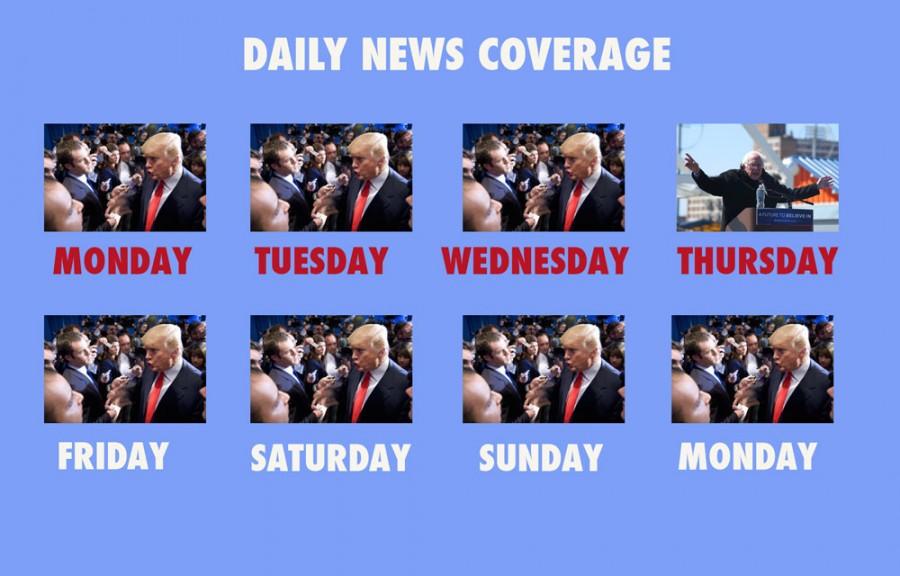The Media’s Campaign
April 22, 2016
Malcolm X once said, “Media’s the most powerful entity on earth. They have the power to make the innocent guilty and the guilty innocent, and that’s power. Because they control the minds of the masses.” If Malcolm X is right about the media’s power to control the minds and masses, one must wonder how the media chooses to influence elections.
The Atlantic magazine put together a “daily dashboard” that tracks national television converge of the presidential election. It is updated each morning, and on Thurs., March 31, Donald Trump led with 214,534 mentions followed by Hillary Clinton with 78,997 mentions. Does that mean the media is supporting Trump?
Not necessarily. All it means is that Trump may be the most profitable. According to the Huffington Post, Trump has received nearly $2 billion in free media attention. Why?
According to Mediamatters.org, a nonprofit progressive research and information center dedicated to monitoring media, as of March 18, ABC World News Tonight had “devoted 81 minutes to Trump” while other candidates such as Bernie Sanders had only received one minute of attention.
Andrew Tyndall, who tracks the networks ABC, NBC and CBS, provided to Mediamatters.org a report in March stating that Trump had received more network coverage than all democratic candidates combined.
Why do certain politicians get more attention? The answer is ratings.
“Trump feeds the beast [of American Media],” says John Nichols’, writing in The Nation. According to The Washington Post, Trump is “a colorful character who makes news.”
However, others believe it has to do with the amount of money the candidates spend on their campaigns. According to Investopedia, a financial online magazine, “The more a candidate spends on their election campaign, the more likely they are to win.”
Does this mean that a candidate with more coverage from the news media is likely to win? According to Sean Bryant, a writer for Investopedia, “The biggest spender typically ends up winning.”
But more coverage doesn’t guarantee the candidate more votes. And media coverage of a certain politician doesn’t necessarily mean that politician will gain more support.
For example, although Trump has received more media attention than any other candidate running, he doesn’t have as many supporters as Bernie Sanders or Hillary Clinton. According to The Washington Post, Clinton has 30 million supporters, almost double the number of supporters as Trump, and Sanders has slightly more.
But complaints have been made about the media’s lack of attention to other candidates.
According to Mediamatters.org, “Media outlets have been widely criticized for showering Trump with nearly endless coverage.” Cable news outlets have also faced backlash for allowing Trump to call in for show interviews, rather than requiring him to appear in person. Mediamatters.org stated that during March, “The outlets studied conducted 39 phone interviews with Trump.” The only news station that didn’t conduct a phone interview was CBS. No other candidates gave call-ins. And Trump was the only candidate called in to any of the five Sunday morning political talk shows.
Trump has been dominating the news screens and it isn’t pleasant to everyone’s eyes. In John Nichols’ opinion piece for the Nation, he writes, “Trump should be covered. But so, too, should other candidates on the Republican and Democratic sides. There’s no need to dial down coverage of anyone … there is a need to dial up coverage of candidates who are not Trump.”
